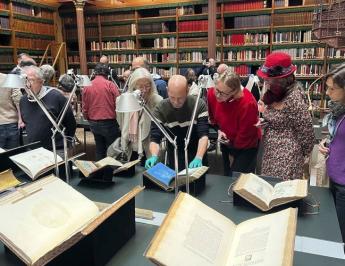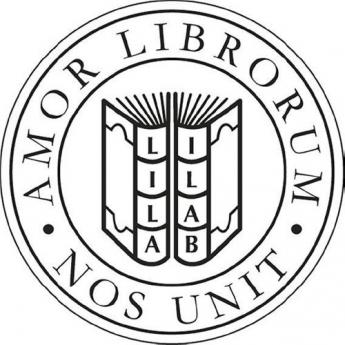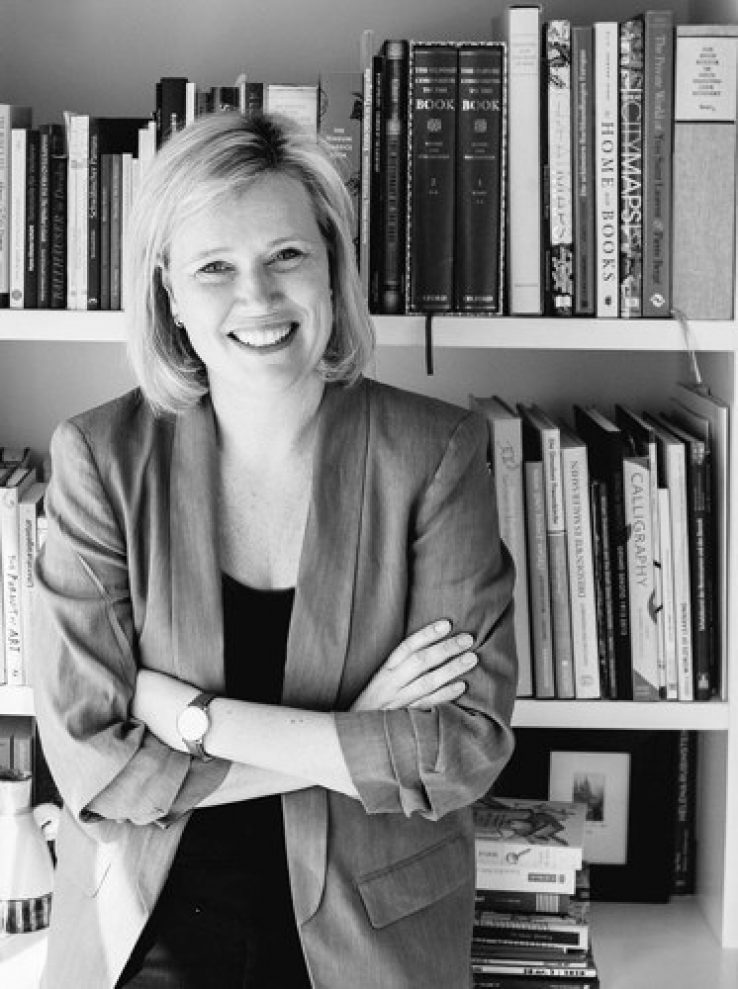Actualités
Binding the book trade together: how associations work to protect and promote dealers - Part 3 of 3

Image above: Inspecting some antiquarian tomes at the ILAB Amsterdam Congress 2024
ILAB
The International League of Antiquarian Booksellers (ILAB), founded in 1947, is the leading international umbrella organisation for the antiquarian book trade, representing 22 national antiquarian booksellers’ associations with over 1600 individual members in 39 countries worldwide. UK bookseller Angus O’Neill was elected ILAB president in October 2024, succeeding Mario Giupponi (Italy). Here, the organisation’s executive secretary Angelika Elstner answers our questions.

How concerned are you about the EU cultural property laws that come into effect in June?
Angelika Elstner: The Import of Cultural Goods Directive, Regulation (EU) 2019/880 is of great concern to ILAB, as it adds unnecessary bureaucracy to a bookseller’s workload. Rare bookshops are largely micro-enterprises with limited capacity to cope with administrative requirements, which are only burdensome for these small businesses.
In recent years, ILAB and peer trade organisations have pointed out to policymakers in Brussels that various studies could not find any evidence that international terrorism is financed by the trade in art and cultural goods.
Looking at the particular situation of the rare book trade, books have always been produced to be sold and to travel: a book might have been printed in Renaissance Venice, skilfully bound in France and then sent to a customer in England.
Books have always been published in editions of several copies, published to be sold, and always sold internationally. Koberger, the publisher of the Nuremberg Chronicle in 1493, had international offices from Lyon to Buda, proving that books were always meant to be exported!
The rare book trade to this day plays a vital role in preserving and promoting cultural heritage by facilitating the exchange of these important objects between collectors, scholars and institutions. ILAB’s mandate is to protect this trade, and in recent years it has worked extensively against unnecessary trade barriers.
Already back in 2018, ILAB, along with other trade organisations, opposed the first draft of the regulation. As a result, when the regulation comes into force in June 2025, books imported into the EU and originally printed or produced outside EU territory will be subject to specific value and age thresholds and will require an importer statement, a slightly less complex requirement than an import licence.
ILAB is also very concerned about the requirements of proof of export licences for objects; many ILAB-affiliated booksellers also deal in prints and art beyond books.
Export licences have historically not always been available, especially when they were not required in the country of origin. Collectors or dealers were also not required to keep and retain export licences in the past. This type of paperwork was often kept by a shipper. The regulations might lead people to believe that if there is no export licence, the object has been exported illegally, which is simply not true.
In March 2024, ILAB submitted comprehensive comments to the European Commission’s Directorate- General for Education, Youth, Sport and Culture on the regulation.
These comments addressed the potential consequences of expanded bureaucracy and firmly emphasised that imposing such regulations on a market composed mainly of small and micro-enterprises, whose expertise significantly contributes to scholarship and the preservation of written and printed heritage, must be approached with care and importantly, with proportionality.
ILAB’s mandate includes regular communication with the boards and presidents of its 22 national member associations worldwide, ensuring that information on this matter is consistently disseminated through these national bodies to booksellers worldwide.

What constitutes good practice and due diligence within the trade with regard to stolen books or those with title issues?
Theft and security have always been a major concern for the League. Security is an international issue; thieves and fraudsters do not stop at borders, so it is vital for the trade to inform colleagues quickly and efficiently, and the book trade has an exemplary security system with an international security mailing list run by ILAB and close co-operation with law enforcement and its member associations.
In 2021, ILAB relaunched the old Stolen Books Database under the new title Missing Books Register, an international database of missing material. Since then, we have repeatedly promoted the system as the heart of ILAB’s mission. Use of the database, whether for reporting or searching, is completely free. It is a service offered by ILAB to anyone dealing in (or buying) rare books and antiquarian material, and ILAB booksellers make effective use of these tools.
In recent years, ILAB has organised symposia, lectures and webinars on security, actively inviting libraries and collectors to participate. As of 2019, ILAB has a Memorandum of Understanding with the Rare Books & Special Collections Section of IFLA, the International Federation of Library Associations, where security issues are one of the main areas of focus.
In addition to these measures, booksellers have always explored the provenance of an item as one of the principal ways to add value.
In-person book fairs – how important are they for booksellers?
While online sales are here to stay, fairs remain essential for sustaining the rare book trade. In-person events are irreplaceable for experiencing objects firsthand, sharing expertise, networking with colleagues and customers and: selling books!
It’s also worth noting at this point that we deal in products that bring joy, even if booksellers face many legal hurdles, as discussed earlier. Attending a fair such as Firsts London at the Saatchi Gallery is an event the book trade anticipates eagerly. At the fairs we meet friends, colleagues, and like-minded people to exchange both general and sometimes very niche knowledge. Fairs show such a large variety of material, in particular large international fairs such as Firsts London in May, it would be hard to browse these objects in such an enjoyable way online.
There is a widespread perception that booksellers are unapproachable, this couldn’t be further from the truth. Just start a conversation, and you’ll quickly find yourself in a deep, engaging discussion.
Is there a changing face of the book buyer?
Against the cliché of an old gentleman's pastime, we are meeting many young and enthusiastic, often female customers. Positions in the modern book trade, the publishing industry or the library world are largely occupied by women and an interest in books is certainly not exclusively a male occupation.
This has been wonderfully demonstrated, for example, with the Honey & Wax Book Collecting Prize, initiated in 2017 by our American colleagues Heather O'Donnell and Rebecca Romney, taking a particular interest in the evolving role of women in the rare book trade, on both the buying and selling sides. They quote the American book collector Mary Hyde Eccles, the first woman elected to New York's celebrated Grolier Club of bibliophiles, who noted that a collector must have three things: resources, education, and freedom. Historically, she observed, “only a few women have had all three, but times are changing!” The prize is going strong and has seen a wide and diverse range of subjects being acknowledged.
Some of our member associations support Young Book Collectors Prizes, such as the ABA National Book Collecting Prize in the UK. The 2024 winner, Howard Kordansky, assembled a thought-provoking collection of prayer books and ephemera highlighting the military contribution and experience of Jewish soldiers during the First World War. His collection will be on display at Firsts London. Discerning and enthusiastic collectors well below the age of 40!
A younger and more diverse clientele is reshaping the trade, encouraging booksellers to cater to a broader range of interests. This shift can have a positive impact on the types of material offered, opening up new or previously underrepresented areas of collecting.
How is the book trade attracting new members?
Across ILAB and its member associations, the declining number of members has been a recurring concern, often accompanied by an ageing membership profile. However, there are encouraging signs that this trend is being reversed.
Our member associations have launched a range of initiatives to attract new booksellers. These include reducing barriers to entry through tiered membership models, such as ‘associate’ and ‘employee’ memberships, as seen in the Antiquarian Booksellers Association in the UK and the Swedish and the Austrian Antiquarian Booksellers Association. These offer younger or less established booksellers a way to join the community, network, and gain access to trade events without the full cost or requirements of traditional membership.
Educational programmes such as the York Antiquarian Book Seminar (UK) and the CABS-Minnesota Antiquarian Book Seminar (US), along with mentorship and internship schemes, including those specifically aimed at increasing diversity in the trade, play a vital role in engaging the next generation of booksellers.
These initiatives are often run in partnership with external supporters and sponsors and are already bearing fruit, with some interns, mentees or graduates transitioning into full-time roles and becoming fully accepted members of a national association. The London Rare Books School, organised by London University’s Institute of English Studies, also includes a module on The New Trade in Old Books, taught by ILAB president Angus O’Neill and another ABA/ ILAB bookseller, Leo Cadogan.
Transparency and communication have also improved. The Antiquarian Booksellers Association of America (ABAA), for instance, recently hosted a Demystifying the ABAA online session to explain the application process and benefits of membership, helping to counter perceptions of exclusivity and elitism. A recruitment committee seeks out potential members and supports them through the application process.
Social media and book collecting prizes also help showcase the vibrancy and evolving nature of the trade, highlighting not only the more classic collecting genres, but also 20th-century materials and ephemera tied to social movements, which appeal to new collectors and dealers alike.
The key to sustaining ILAB’s global network lies in these grassroots efforts and our ability to adapt to the changing landscape of the rare book trade. By working together across national associations and continuing to promote bookselling as a dynamic and rewarding career, we can ensure the future of our global community.
New requirements – legal, institutional and public – are increasingly demanding of booksellers and libraries. What are the challenges booksellers and libraries are facing today? Are the new demands on provenance always justified and proportionate? How can we find a balance that meets everyone’s needs?
Booksellers and libraries today are navigating a complex and rapidly evolving landscape shaped by legal, institutional, and ethical demands around provenance. Since 2019, the ILAB symposia have provided a forum for ILAB booksellers and rare book and special collections librarians to engage in meaningful dialogue on these issues. Many of the new requirements stem from a growing recognition of the need for greater transparency in the trade, as well as a legitimate and necessary effort to combat the illegal trafficking of cultural property. However, while these goals are necessary and thoroughly commendable, their implementation poses significant challenges for booksellers in practice.
One major difficulty lies in the fragmentation of provenance information. Relevant data is often scattered across collections, databases, and institutions, making research time-consuming and often inconclusive. Moreover, the durability and accessibility of these digital tools can be compromised, as dramatically illustrated by the cyber-attack on the British Library, highlighting the vulnerability of even our most established institutions.
Legal inconsistencies across national boundaries exacerbate the issue. For instance, thresholds for requiring export certificates vary widely. A patchwork of rules not only hampers international trade but also creates significant administrative burdens for booksellers who must keep up with ever-changing regulations.
Rare book businesses are mostly micro businesses and laborious provenance requirements are very challenging for our booksellers. While we recognise the need for compliance, our affiliates just don't have the resources of Amazon and similar multinationals.
Compensation mechanisms in cases of restitution remain inadequate or even non-existent in some countries. Germany, for example, offers no compensation to good-faith holders when an item must be returned, and even in France, compensation is capped at a mere 10% of the item’s value, hardly a sufficient safety net for dealers operating in good faith.
It’s also important to recognize that many antiquarian booksellers enter the field guided by a deep love of books, not formal training. This has left them at a disadvantage when faced with increasingly technical and legalistic provenance requirements. Book Seminars (as mentioned above) and training programs are helping bridge this gap, offering practical support for booksellers to develop the right tools.
Are the new demands always justified and proportionate? The answer is nuanced. The intentions behind them, transparency, ethical stewardship, and combating illicit trade, are certainly justified. But proportionality remains a concern. The demands must be balanced with the day-to-day realities of booksellers and institutions. Professionals will demonstrate due diligence and good faith but cannot always deliver absolute certainty, which is in any case often unattainable.
Ultimately, finding a balance requires continued dialogue and collaboration between regulators, cultural institutions, and the trade. A shared commitment to provenance, paired with realistic expectations, is the only path forward that respects both the integrity of the cultural items we deal with and the viability of the rare book trade.
What activities are ILAB undertaking in 2025?
A number of key activities that reflect its ongoing commitment to education, collaboration and advocacy in the rare book trade.
One of the main highlights is the 2025 ILAB Symposium, Old Books, New Perspectives: Rare Booksellers, Librarians & Collectors in Dialogue, which will take place on July 30 at the Wheeler Centre in Melbourne, Australia. This international forum will bring together experts from around the world to discuss pressing issues such as theft prevention, ethical conservation practices, and best practices in cataloguing rare materials.
The symposium is part of a continuing series following successful events in New York (2019), Oxford (2022), and Paris (2024), and coincides with ILAB’s Annual General Meeting, Melbourne Rare Book Week, and the Melbourne Rare Book Fair. It is co-sponsored by ANZAAB (The Australian and New Zealand Association of Antiquarian Booksellers).
Since 1948, the League and its member associations have organised congresses, which now take place every two years at a different location worldwide and are a wonderful opportunity for ILAB-affiliated booksellers to network. Last year, we gathered in Amsterdam and we are now working on the preparations for the 46th ILAB Congress in September 2026 in Berlin, the first one in Germany in over 30 years.
Next year will see the celebration of the 19th ILAB Breslauer Prize for Bibliography, the world’s leading prize honouring outstanding publications in the field of bibliography and book history. Authors, publishers, academics, scholars, and the book trade are now invited to submit publications.
The prize is awarded every four years, with a first prize of $10,000 and second and third prizes of $5000 and $3000 respectively. For the first time, three additional awards of $1000 each will be offered for a publication from an Asian, African, and Central and South American publisher or author.
With these new awards, we hope to encourage broader participation and recognise the rich and diverse contributions to the field from around the world. In addition, ILAB will continue to support scholarships for international book seminars in the UK, the US, and France, helping to foster the next generation of professionals in the field. It also remains active in advocacy work, engaging with policymakers at institutions such as the European Commission and cultural organisations such as UNESCO, and has been invited to speak at international trade and library events to represent the interests of the antiquarian book trade on a global stage.
ILAB was established “with the aim of establishing new hope for international peace through open markets". Was this ever more relevant than today?
What can we expect under the new ILAB presidency?
We will continue to build on the work of our predecessors in the hope of increasing accountability, responsibility and transparency in all our dealings… but, above all, introducing as many different people as possible to the joys of owning and studying rare and unusual books.
